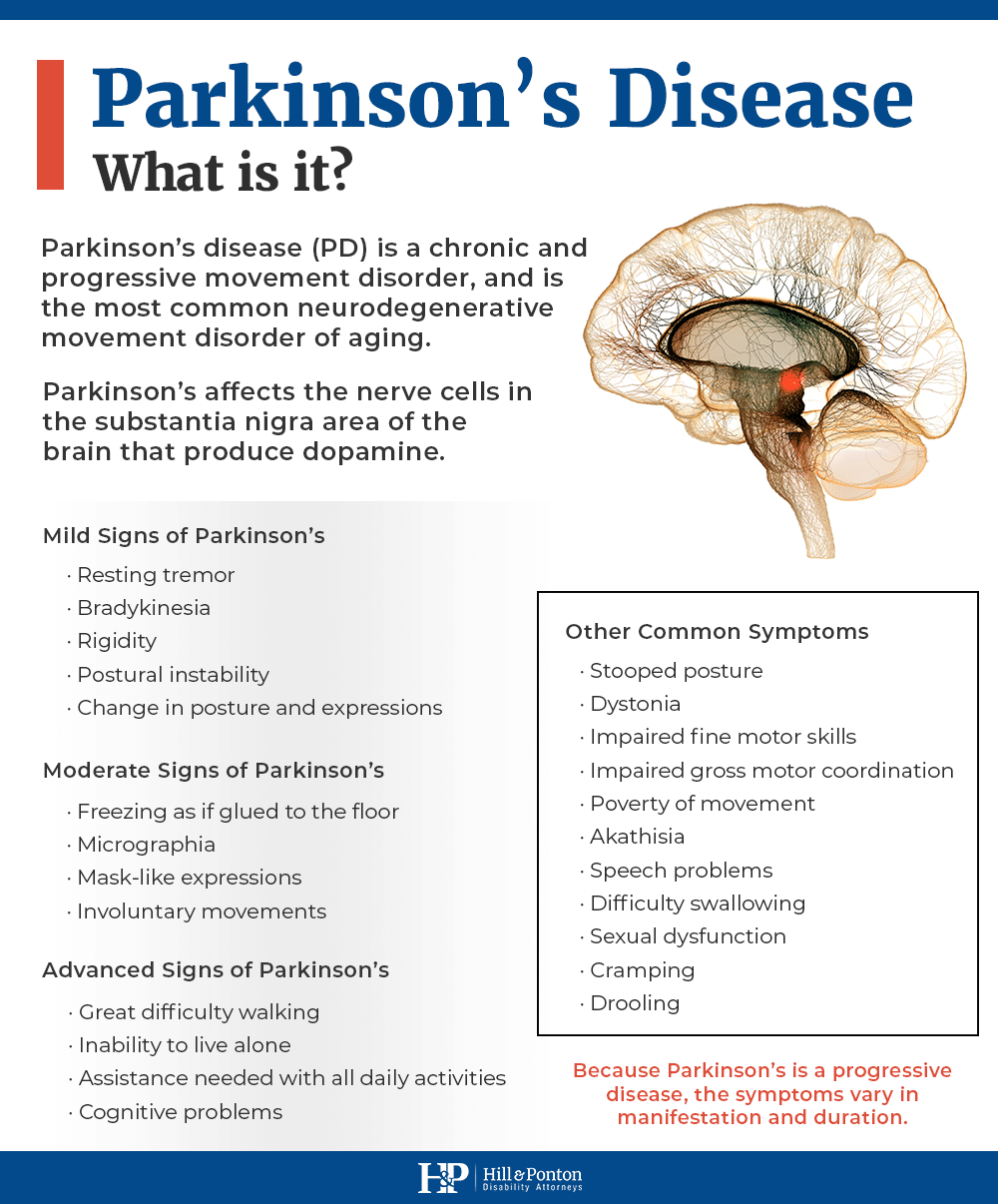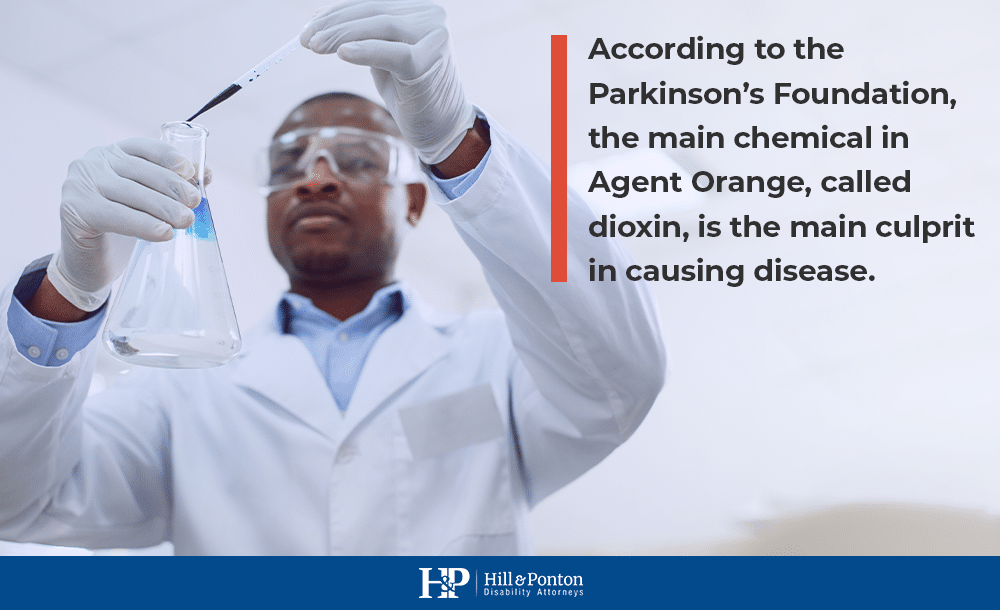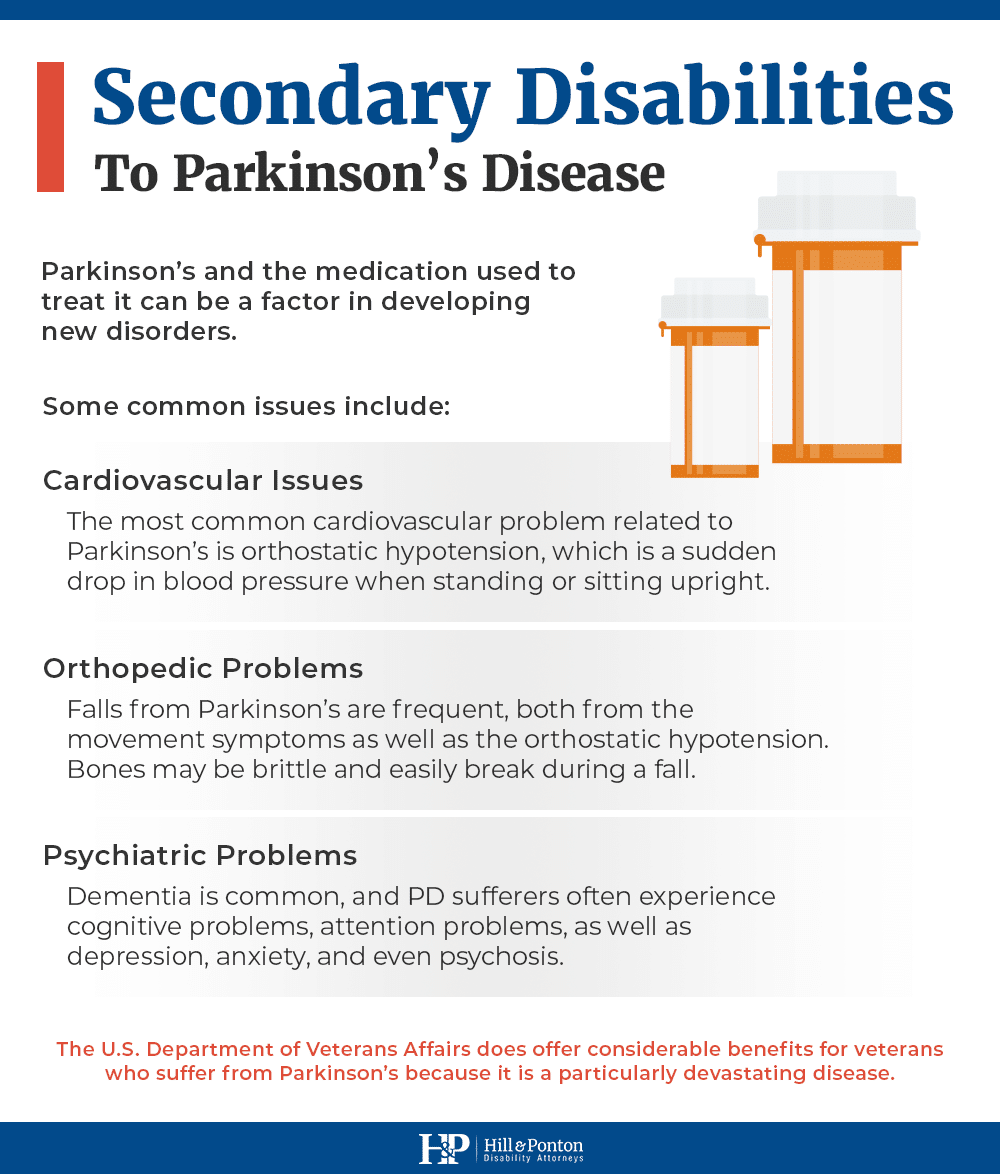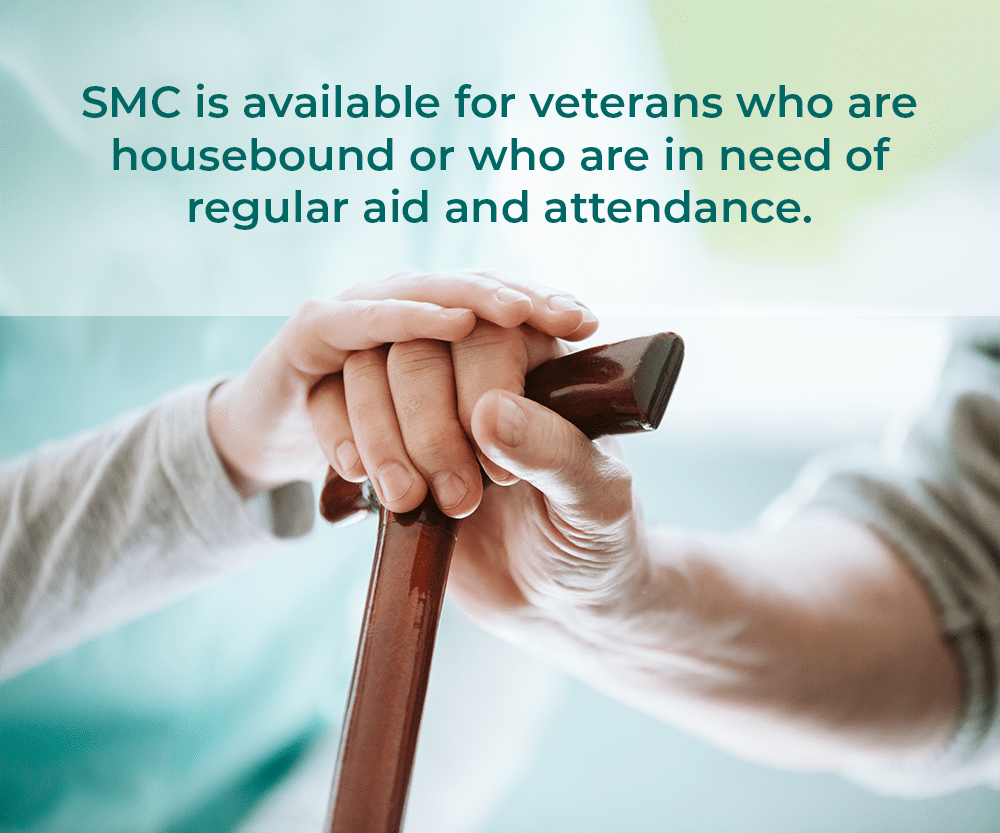If you are a former military service member living with Parkinson’s Disease, you may be eligible for compensation through the United States Department of Veterans Affairs. There are a few steps that you will need to complete to receive a VA rating and disability benefits for Parkinson’s, as well as benefits for conditions that are secondary to Parkinson’s Disease.
What Is Parkinson’s Disease and How Does It Affect Veterans?
Parkinson’s disease is a chronic and progressive movement disorder, and is the most common neurodegenerative movement disorder of aging. Parkinson’s affects the nerve cells in the substantia nigra area of the brain that produce dopamine. Dopamine is a chemical that sends messages to the part of the brain that controls movement and coordination. As Parkinson’s progresses, the amount of dopamine produced in the brain decreases, leaving a person unable to control movement normally.

Common Symptoms of Parkinson’s Disease
Because Parkinson’s is a progressive disease, the symptoms vary in manifestation and duration. Listed below are signs of Parkinson’s at the initial/mild stage, the secondary/moderate stage, and advanced stage. We also cover parkinson-like symptoms.
Initial/Mild Sign of Parkinson’s:
- Resting tremor
- Bradykinesia – slow movement
- Rigidity – stiffness & inflexibility of the limbs, neck & trunk
- Postural Instability – tendency to be unstable when standing upright
- Change in posture and facial expressions
Secondary/Moderate Signs of Parkinson’s:
- Freezing – the temporary sensation of one’s feet being glued to the floor
- Micrographia
- Mask-like expressions
- Involuntary movements
Advanced Signs of Parkinson’s:
- Great difficulty walking; in wheelchair or bed most of the day
- Inability to live alone
- Assistance needed with all daily activities
- Cognitive problems, including hallucinations and delusions
Other Common Signs of Parkinson’s
- Stooped posture, a tendency to lean forward
- Dystonia
- Impaired fine motor dexterity and motor coordination
- Impaired gross motor coordination
- Poverty of movement (decreased arm swing)
- Akathisia
- Speech problems, such as softness of voice or slurred speech caused by lack of muscle control
- Difficulty swallowing
- Sexual dysfunction
- Cramping
- Drooling
Service Connecting Parkinson’s Disease
Some former service members may be eligible for direct service connection, meaning something happened in military service that caused your Parkinson’s or the disease was first diagnosed or manifested during service. This service connection is not easy to prove and will almost always require an independent medical opinion to show that you were beginning to show signs of Parkinson’s during service or a particular chemical you were exposed to caused the condition.
Parkinson’s Disease as Presumptive to TBI
Parkinson’s has been associated with physical injuries to the brain and the VA has recognized this link, making it easier for veterans to claim disability benefits. Parkinson’s Disease is presumed to be service connected when it develops after a moderate or severe Traumatic Brain Injury suffered during service.
Chemical Exposure & Parkinson’s Disease
Studies have also shown that exposure to certain chemicals can cause Parkinson’s Disease. Among them, trichloroethylene (TCE) is the toxin most strongly linked to Parkinson’s by researchers trying to identify the environmental causes of the disease.
But while Camp Lejeune veterans with Parkinson’s are presumed to have developed the condition from exposure to the TCE and PCE in the base’s drinking water, those stationed elsewhere will need to prove service connection. Learn how from this article.
Probably the best-known toxin causing Parkinson’s Disease and parkinsonism in veterans is Agent Orange, which VA has included in its list of presumptions.
Agent Orange & Parkinson’s Disease
Agent Orange was used in chemical warfare during the Vietnam War. Since then, Vietnam veterans have developed a variety of symptoms related to Agent Orange exposure. This includes Parkinson’s Disease, which is one of the presumptive conditions related to Agent Orange that the VA recognizes.

Since 2021, parkinsonism is also recognized by the VA and veterans who served in an area with Agent Orange exposure and have parkinsonism can take advantage of the VA’s rules for presumptive service connection to obtain VA disability benefits.
If you’ve previously had a claim denied for Parkinson’s Disease or parkinsonism, our law firm can assist you in the appeals process and get your health care and veterans benefits squared away.
How VA Rates Parkinson’s Disease
Once you are awarded service connection for Parkinson’s, the fight may not be over. This is mostly because of the VA disability claim and rating system the VA uses for Parkinson’s. The minimum rating you can be awarded by the VA for Parkinson’s disease is 30%, but if you fail to appeal that rating, you are potentially leaving thousands of dollars of benefits on the table.
What Is the VA Rating for Parkinson’s Disease?
A 30% rating is given by the VA to veterans who have the diagnosis of Parkinson’s, and is basically acknowledging that they have the condition. Veterans may however be eligible for ratings up to the maximum 100%, from complications of the disease.
What many veterans do not realize is that once you are service connected for Parkinson’s Disease, you are entitled to service connection for all the other problems that the condition causes: talking, swallowing, walking, balance problems, using your hands, memory, concentration, depression, and many more. If you have Parkinson’s, you may get a separate rating for any condition that it causes. As you may guess, this can be a long list, especially as the disease progresses.

Why You Might Be Underrated
Attorneys Matthew Hill and Carol Hill explain why the VA might be assigning a lower rating than it should – and how to get increased compensation for Parkinson’s and all its complications.
Do your benefits fully reflect the effects Parkinson’s disease has on your life? Get a free evaluation of your claim – our VA-accredited attorneys may be able to help you increase compensation!
Free case evaluationDisabilities Secondary to Parkinson’s Disease
While Parkinson’s is a neurological movement disorder, veterans should keep in mind that it can severely affect other systems in the body. It’s well-known that the same chemical exposure (for example Agent Orange) also causes other disorders, such as ischemic heart disease. However, often it is the Parkinson’s itself, or the medication used to treat it, that is the causal factor in the development of a new disorder.
Whether a veteran’s Parkinson’s disease was caused by exposure to the TCDD in agent orange, pesticides, trichloroethylene, or its origins are unknown, Parkinson’s causes many secondary health effects and disabilities.
Cardiovascular Issues from Parkinson’s
Parkinson’s is known as a neurodegenerative disorder; that is, it causes neurons to degenerate or decay. The most famous area for PD degeneration is in an area of the brain called the substantia nigra, where Parkinson’s causes the death of neurons that generate dopamine, a neurotransmitter which is involved with movement. However, some studies have also shown that Parkinson’s attacks nerves in the heart which produce another neurotransmitter, noradrenaline. This typically takes place in the left ventricle and can have many complications.
Noradrenaline is the primary messenger used by the sympathetic nervous system, the system of the body used to control things we don’t consciously think about: the beating of the heart, breathing, blood pressure, even how dilated our pupils are at any given time.
The most common cardiovascular problem related to Parkinson’s is orthostatic hypotension, which is a sudden drop in blood pressure when standing or sitting upright. Many Parkinson’s patients may need to get out of bed or out of a chair extremely slowly to avoid passing out. This can cause further secondary disabilities, including orthopedic or muscular trauma due to falls.
Common Medication for Parkinson’s Can Also Cause Heart Problems
Medications such as Levodopa can be a lifesaver to Parkinson’s sufferers, however up to 10% of those medicated by PD medications such as Levodopa, Carbidopa, and Entacapone experience cardiovascular symptoms such as irregular heartbeat, hypertension, ischemic heart disease, and stroke. One study found that 2.4% of patients who were taking carbidopa/levodopa had cardiovascular ischemic events, compared to only 1.1% in patients taking a placebo.
A 2013 study found a nearly three-fold increase in the risk of stroke in patients with Parkinson’s. There is also a two-fold increase in the risk of heart failure and a 50% increase in the risk of dying from heart failure in Parkinson’s patients.
Orthopedic Conditions
Falls from Parkinson’s are frequent, both from the movement symptoms as well as the orthostatic hypotension noted above. As Parkinson’s frequently attacks the elderly, their bones may be brittle and easily break during a fall.
To make matters worse, Parkinson’s sufferers have an increased risk of developing osteoarthritis and osteoporosis. This is believed to be due to a loss of bone mass resulting from the fact that PD sufferers tend to move around a lot less than non-sufferers.
In those sufferers who have had severe falls or needed spinal or other surgery, the tremors associated with Parkinson’s often severely affect recovery, or make total recovery nearly impossible. A cast is designed to reduce movement of a recovering limb; involuntary tremors are not helpful in this regard.
Psychiatric Effects
Both Parkinson’s itself, as well as the medications used to treat it, can have severe psychiatric effects that can often be extremely debilitating. Dementia is common, and PD sufferers often experience cognitive problems, attention problems, as well as depression, anxiety, and even psychosis.
The primary problem in Parkinson’s disease involves the creation of dopamine, and while dopamine is involved in movement, it also is involved in addictive behavior. Often, bizarre behavioral changes happen in patients who are being treated with Parkinson’s medication, such as sexual addiction, compulsive gambling, binge eating, and overuse of medications.
Other Issues Related to Parkinson’s Disease
As mentioned above, Parkinson’s affects the parts of our neurological system that works automatically, without effort. We do not will food along our digestive tract or decide to start sweating more; it just happens. As such, many seemingly smaller problems can arise. Many Parkinson’s sufferers experience constipation, loss of bowel and/or bladder control, excessive sweating, vision problems, and even the loss of the sense of smell (anosmia).
Sleep problems are extremely common in Parkinson’s patients. REM disorders, where patients actually act out their dreams, can be extremely dangerous and occur frequently in Parkinson’s. Other patients experience insomnia, others cannot stay awake. In fact, 13% of Parkinson’s patients who are on medication experience sudden sleep attacks.
50% to 80% of patients with Parkinson’s disease have abnormal glucose tolerance which Parkinson’s medication may worsen. However, the link between diabetes and Parkinson’s is not yet fully understood. Diabetes may be secondary to Parkinson’s, particularly if the patient is obese, is experiencing binge eating due to medications, and is not moving as much as they used to. However, some research actually points to diabetes as being a possible culprit in the development of Parkinson’s, so this association may go either way.
Parkinson’s is an insidious and difficult disorder to experience, and we can see that it is much more than just some tremors. If you have service-connected Parkinson’s, you need to be fully aware of these secondary conditions in order to receive the medical care and compensation you deserve.
Paths to 100% VA Disability for Parkinson’s (and More)
If you are service connected for Parkinson’s, you also need to apply for a Total Disability Rating based on Individual Unemployability. Often veterans are initially rated as 30 percent disabled by the VA for Parkinson’s but are on Social Security for Parkinson’s. If you are unable to work because of Parkinson’s, it is important to file a claim for individual unemployability with the VA.
Individual unemployability (IU) allows a veteran to receive compensation at the 100% rate, even though their service-connected conditions weren’t rated at 100% by the VA. The impact that Parkinson’s has on your ability to work depends on the severity of the symptoms. If Parkinson’s disease does begin to affect your ability to work, don’t forget to look at applying for IU.
IU is typically granted when a veteran has service-connected conditions that meet specific rating requirements. However, just because you don’t meet specific rating requirements does not mean you should not apply for IU. If your service-connected condition(s) prevent you from obtaining and securing a substantially gainful job, then you are entitled to IU.
Special Monthly Compensation (SMC) is compensation that is awarded above and beyond the 100% disability payments for conditions that are more serious and more debilitating than for which the 100 percent rate for Parkinson’s is able to compensate. For instance, you may be eligible if you are housebound or need aid and attendance. Find out more about the SMC for Parkinson’s Disease.
Note that this is not a separate claim and is instead part of the original appeal. When you appeal for a higher rating for Parkinson’s Disease, it is a good idea to also appeal for individual unemployability and any SMC to which you are entitled.
Get the Help You Need
The U.S. Department of Veterans Affairs does offer considerable benefits for veterans who suffer from Parkinson’s because it is a particularly devastating disease. It is likely that you would be eligible for compensation above and beyond the 100 percent rate when you factor in SMC.
If you’re a former service member living with Parkinson’s Disease, the attorneys at Hill and Ponton are available to help. Our team can work with you to navigate the VA disability rating process, so you can earn the disability benefits that you’re entitled to. Contact us today for a free case evaluation.




